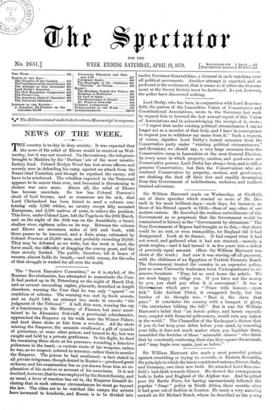Sir William Harcourt made on Wednesday, at Sheffield, one of
those speeches which remind us more of Mr. Dis- raeli in his most brilliant days,—such days, for instance, as those of his Stroud speech in 1858,—than of any other of our modern orators. He described the restless embroilments of the Government as so perpetual, that the Government would be remembered in history as the " Government by ultimatum." The Tory Government of Repose had brought us to this,—that there could be no rest, or even tranquillity, for England till it had disappeared. Look at its finance. It had reaped what it had not sowed, and gathered what it had not strawed,—namely, a great surplus,—and it had turned it in five years into a deficit of precisely equal amount. (Here Sir William Harcourt was short of the truth.) And now it was staving off all payment, with the shiftiness of an Egyptian or Turkish Treasury Board. The Government treated the country to an expensive policy, just as some University tradesmen treat Undergraduates to ex- pensive furniture. "Pray, let us send home the article. We are most happy to oblige you. If you have not the money by you, you shall pay when it is convenient." It was a Government which gave us " Peace with honour,—upon tick." Like Anffient Pistol, it swaggered freely, but the burden of its thought was, " Base is the slave that pays." It entertains the country with a banquet of glory, "the entertainer bilking the bill." But it was Sir William Harcourt's belief that "an heroic policy, and heroic expendi- ture, coupled with financial poltroonery, would ruin any nation in the world." The Chancellor of the Exchequer's dictum that if you do but keep your debts before your mind, by renewing your bills, it does not much matter when you liquidate them, resembled the doctrine of those " miserable sinners " who think that by constantly confessing their sins they square the account, and "may begin over again, just as before."


































